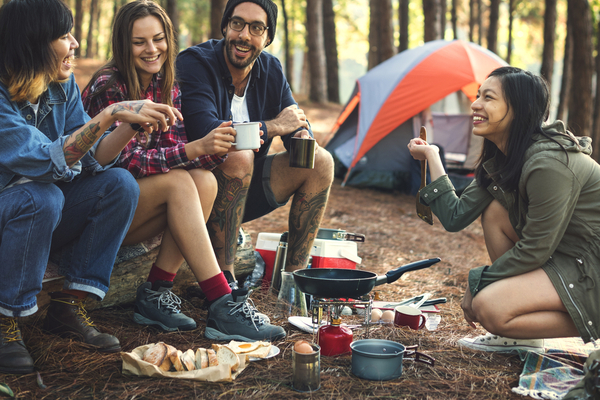Camping is a low-impact, rather than no-impact, way to travel, and it’s become hugely popular during the summer of Covid-19. It’s also one of those Zen riddles in which we’re both part of the problem and part of the solution. More people are traveling, trying to stay safe, maintain distances, and enjoy nature, but at the same time, the reports of people leaving piles and piles of trash behind, not following “no burn” rules at campsites, and other destructive behaviors, are both disheartening and frightening, considering all of the wildfire activity up and down the west coast.
You can enjoy the great outdoors and leave it beautiful for the next campers. Simply adhere to the following guidelines from the Leave No Trace Center for Outdoor Ethics, an organization based in Boulder, Colorado, and you can minimize impacts both on the environment and on your fellow travelers.
- Plan Ahead and Prepare
Reduce waste before you leave home by re-packing food and getting rid of wrappings and other packaging. Check in advance about site restrictions. The less you take with you, the less you’ll have to take out or try and dispose of.
- Travel and Camp on Durable Surfaces
Try to use existing fire rings and campsites when in an area without formal facilities, especially wilderness areas. Keep to official trails instead of walking through vegetation.
- Dispose of Waste
Pack it in, pack it out is the guiding principle. Before you leave the campsite, pick up any trash or food, and leave the area cleaner than you found it. This includes your, uh, human waste. Use portapotties if they’re provided. If not, dig a hole and bury it deep. Think about it from the next camper’s perspective. Would YOU want to come to an idyllic campsite and be surrounded by someone else’s poop? Didn’t think so.
- Stay Clear of Water Sources
Set up camp 200 feet (about 70 paces) or more from lakes and streams to lessen the impact on water quality and local wildlife. When cleaning dishes (or yourself) use only small amounts of biodegradable soaps. Hand sanitizers also reduce water usage.
- Leave What You Find
If you come upon a fossil, arrowhead, or beautiful rock, it’s easy to think, “Well, what’s the harm in just taking one?” But many are protected, especially in state and national parks, and removing them could come with heavy fines, so leave them where they are.
- Reduce Campfire Impact
Everyone loves a roaring campfire. But large ones are more destructive. Use a lightweight stove for most of your cooking and keep campfires small. Be sure to completely extinguish fires. And pay attention to posted signs! If it says “no campfires,” they aren’t doing that to bum you out, it’s because there’s an extremely high fire danger, so just DON’T.
- Respect Wildlife
You’re on their turf, so don’t be rude. Keep a distance while observing animals. Never feed wildlife, because animals that associate humans with food can become nuisances or even dangerous. And that cute, playful little bear cub? It’s Momma is sure to be nearby and she’s not so playful. Store food so it doesn’t present a temptation.
- Be Considerate
The Golden Rule applies equally to camping. Make sure you keep campground etiquette in mind.
—
Photo Credit: Rawpixel.com / Shutterstock.com
